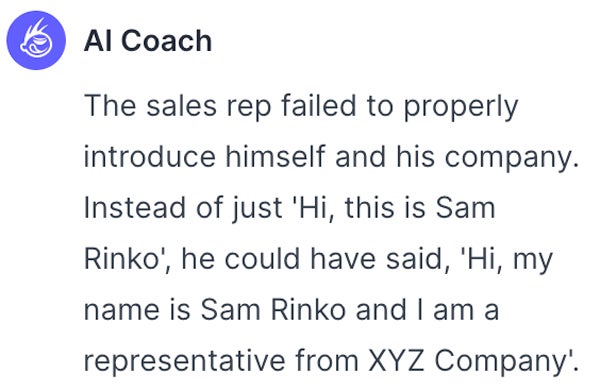Artificial intelligence has many applications for sales training, from facilitating sales roleplay sessions to providing coaches with advanced performance analytics they can use to inform their sales training plans.
This is a huge boon for salespeople. In sales, the most effective way to develop skills is through consistent, deliberate practice enhanced by accurate, evidence-based feedback. Artificial intelligence makes both of these more accessible than ever before.
We’ll look at how to make the most of this new technology, and share ways to integrate AI sales training tactics and software into your company’s skill development program.
TABLE OF CONTENTS
What Is AI Roleplay In Sales Training?
One of the most powerful applications of artificial intelligence (AI) in sales training is in sales roleplaying.
AI roleplay refers to the activities and software that sales reps use to simulate real-life conversations with customers as a form of sales practice.
With an AI role-play training platform, sales leaders can customize AI chatbots that match their various buyer personas.
Sales reps can then speak or message with the AI in various pre-made or custom sales scenarios, from cold calls to objection handling sessions.
For instance, here’s a basic mock sales call scenario in PitchMonster:
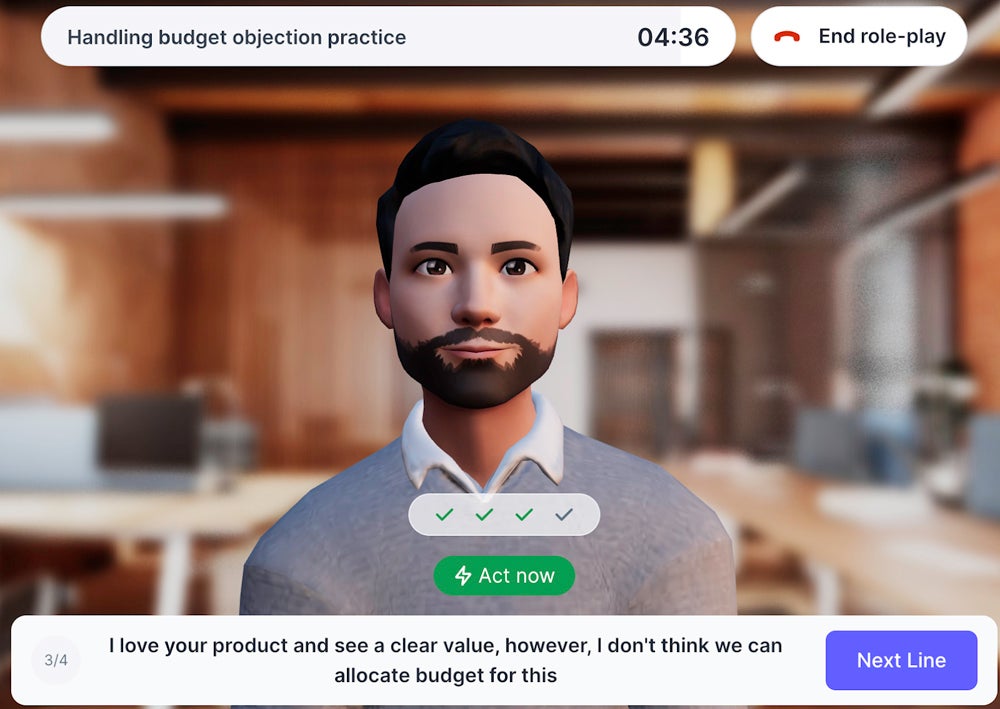
After the roleplay exercise, reps receive feedback about their performance, helping them improve next time around.
Here’s what an AI coach thought of my performance (seems like fair advice):
On some platforms, you can even upload your company’s sales standards so that the feedback is in line with your company’s sales methodology and skill development goals.
These AI role-play tools are still in early development, so they may have limitations, but look for them to become increasingly realistic and advanced as time goes on.
To gain a deeper understanding of today’s AI software for sales, read our guide to AI Sales Tools and Software
Key Components of an AI-Driven Sales Training Program
There are three main components to an AI-driven sales training program: AI-powered roleplay partners, a conversational intelligence platform, and sales performance analytics.
All three work in tandem to empower coaches and accelerate the skill development of your customer-facing team.
AI-Powered Roleplay Partners
AI-powered roleplay partners are the AI chatbots and avatars with whom your sales reps will practice various sales conversations.
While it’s certainly possible to create your own AI chatbots by training ChatGPT on your customer persona, product info, and call transcripts, it’s far easier to invest in AI sales training software that comes with a pre-built, yet customizable AI avatar.
These tools provide in-depth feedback to help reps improve quickly:
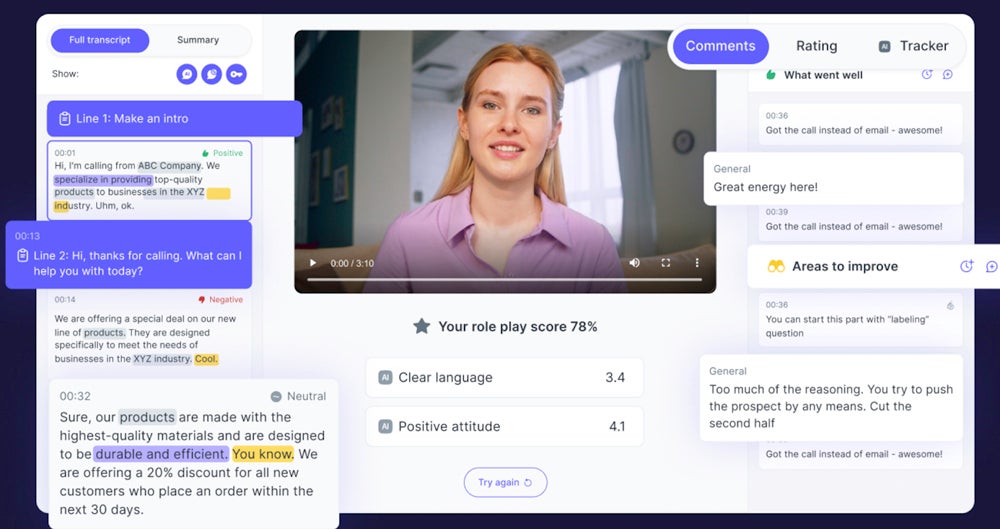
Conversational Intelligence Software
If AI role-play software facilitates your call practice sessions, conversational intelligence tools like Gong will help you identify which skills your reps should be practicing.
By monitoring and analyzing a rep’s sales calls, these platforms can identify weak spots where the calls generally go wrong, as well as best practices to reinforce in your training.
For instance, the tool might discover that one of your reps is too talkative during discovery calls and that the best reps ask 8-10 questions per call.
This insight will help you design an AI roleplay exercise that will help the rep overcome this weakness.
Sales Performance Analytics
Sales performance analytics tools, often found in your CRM, help you identify key improvement areas in your rep’s skill sets by tracking key performance metrics.
For example, if an Account Executive has an unusually high loss rate in the demo phase of the sale, it’s time to focus on coaching them on that skill.
Performance analytics also helps you assess the effectiveness of your sales training program. If your cold calling reps have been using your AI roleplay to practice for several months and booked meetings per call aren’t rising, it’s time to update the exercise.
To learn about AI for customer relationship management, read our guide: Top 8 AI CRM Software
How Is AI Used For Sales?
With so many AI companies in the market, artificial intelligence is entering almost every function and stage of sales, from automating repetitive tasks to facilitating sales training activities.
Below are some of the key use-cases for AI in sales:
- Create Sales Scripts: Generative AI like Chat-GPT can help you brainstorm and write sales scripts to use when talking with your target audience.
- Automate Inbound, Transactional Sales: AI chatbots can help inbound customers on your website find products, conduct research, and make the purchase.
- Improve Sales Training and Coaching: With AI role-playing software and data analysis tools, reps can more easily practice and get helpful feedback about their skills.
- Power Sales Forecasting: Predictive sales analytics platforms, powered by AI, can help you make more accurate sales forecasts and adjust accordingly.
- Automate Sales Tasks: AI features can automate simple tasks like updating CRM data fields, which leaves reps more time for practice and conversations with buyers.
- Ideate Sales Questions: Sales reps can give AI chatbots info about the buyer they’re speaking with and ask the tool to ideate relevant questions they should ask the buyer.
By streamlining the sales process, AI gives reps more time to focus on practicing and developing the core skills of their craft.
4 Benefits of Using AI In Sales Training
By including AI in your sales training program, you can make role-play more impactful, spot improvement areas, empower reps to self-train, and automate repetitive sales coaching tasks.
Make Role Playing Feel Realistic to Reps
Sometimes, when a sales rep is running through mock calls with a peer or manager, it’s hard for them to take the role-playing exercise seriously.
Despite their efforts in imagination, the rep knows this is the same person they ate lunch with earlier, not the persnickety, slightly hostile lead they’re pretending to be.
With AI chatbots, salespeople often feel like they’re having a real conversation with a buyer. It’s also less awkward, so reps are more likely to put in effort and take it seriously.
Easily Identify Key Improvement Areas
With performance analytics software, AI coaches, and conversational intelligence tools all providing you and your reps with data about their performance, it’s easy to spot skills that need development.
AI coaching tools like Mindtickle will even assign scores to reps for different training exercises:
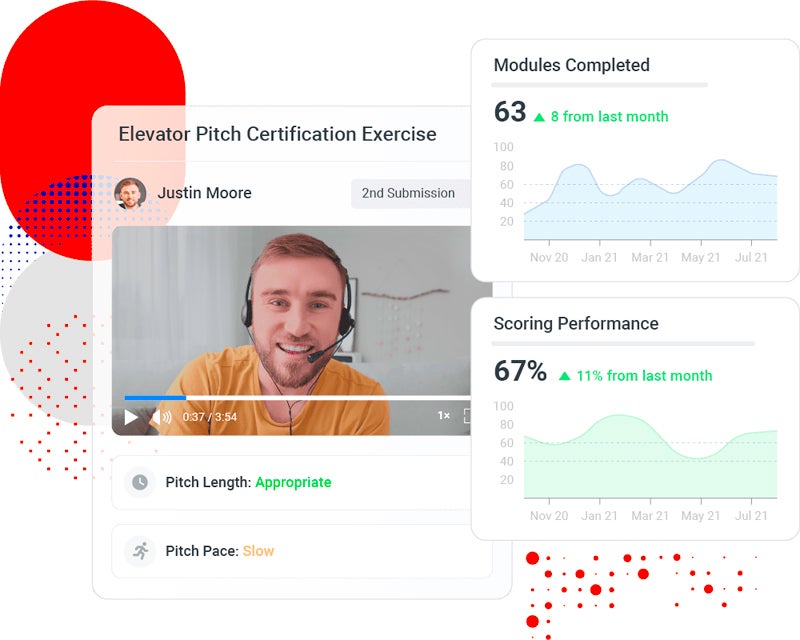
This feedback allows you to personalize training and focus it on weaknesses rather than strengths.
You’ll also be able to use AI to find team-wide trends and bottlenecks that you can address in team training sessions.
Equip Reps to Train Themselves
Imagine a rep has a sales call in thirty minutes with a new type of prospect and wants to run through some mock conversations but doesn’t have anyone to practice with.
Thanks to AI role-playing software and AI chatbots, they can easily warm up for the call on their own.
Plus, they can expose themselves to various scenarios without actually experiencing them in the sales world, so when the situation does occur, they’re prepared.
Best of all, access to role-play practice allows reps to practice more often, so their skills develop faster.
Free up Time for Sales Coaches and Managers
With generative AI tools automating performance analysis and role-play, sales coaches have more time for the parts of sales training only they can do.
Those activities include motivating reps, helping them navigate tricky deals, and creating more advanced sales training curriculums.
How To Use AI To Train Your Sales Team
AI can help you run roleplays, practice for sales calls, scale and automate coaching, and onboard new reps. Let’s dive deeper into how this technology helps with each of these sales training activities.
AI Sales Roleplaying
AI roleplaying software enables you to put your sales reps into a variety of virtual real-life sales scenarios with AI-powered avatars who match your ideal customer and resemble real buyers.
This enables reps to practice their conversational skills on-demand for a wide scope of sales calls, including cold calls, discovery, presentations, negotiation, and closing.
Using AI to analyze these practice calls, these tools will also provide reps with feedback on their sales vocabulary, use of filler words, ability to hit the key points in your sales script, and more.
This allows reps to practice without a sales coach – which is a greatly improved use of overall staff time.
Preparing for Upcoming Sales Calls
Sales reps can use generative AI tools like Chat-GPT to prepare for upcoming sales calls.
After training the tool on your customer data and the specifics of the sales scenario, reps can use the chatbot to brainstorm potential objections and questions they should be prepared to answer.
As an example, in a recent interview, Sales Coach Chris Dupre at Impact shares a specific use case.
He discusses how he sometimes uploads a call transcript into Google Docs and labels the seller as A and the prospect as B. Then he loads that into Chat GPT, tells the chatbot to play person B, and asks it to role-play a sales conversation.
He’ll also use this tactic to identify actions that’ll move the deal forward.
For instance, after uploading the call transcript, he might ask the AI chatbot which hurdles he still needs to get over to close the deal, or which questions he should ask to move things forward.
This brainstorming exercise allows reps to think through potential paths the upcoming conversion could take, and prepare responses, rebuttals, and questions ahead of time.
Even if all the scenarios are off the mark, the rep will go into the call feeling more confident, which matters a lot in sales.
AI Coaching and Feedback
Whether it’s assessing a rep’s performance during their role-play session or reviewing a new hire’s first sales call with a prospect, AI coaching tools make coaching far more scalable by taking over many of the performance analysis and feedback responsibilities.
Conversational AI platforms like Gong can also monitor every call your team makes, analyze the conversational data, and discover the actions and behaviors of top performers.
Aware of these best practices, the AI coach listens to each rep’s calls and gives them recommendations for how they can improve, such as “focus more on talking benefits.”
Further, AI coaching tools also typically come with a searchable database of past calls. This enables reps to easily study the habits and techniques of top performers.
It can also help sales managers identify each rep’s weak points:
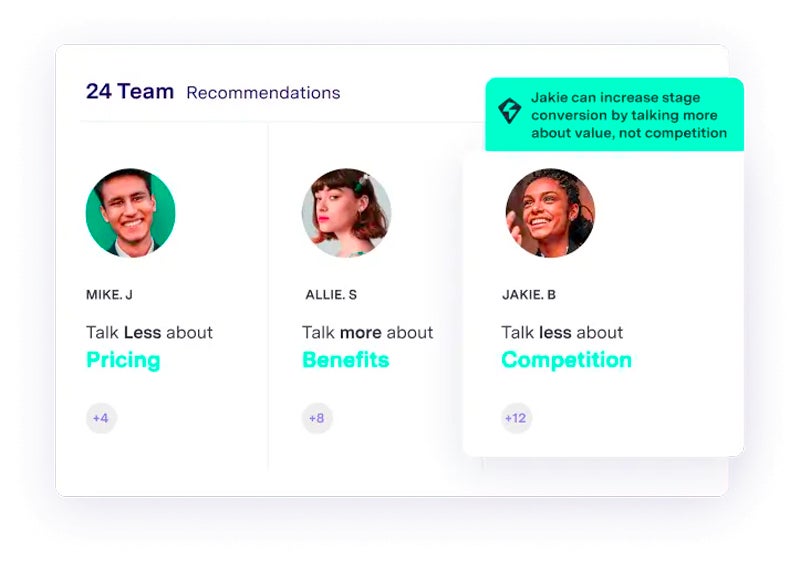
Onboarding New Sales Reps
Sales onboarding software helps you speed up your ramp time so new salespeople start performing in weeks rather than months.
These tools allow you to build onboarding pathways, which include various exercises, AI role-play, training videos, templates, training documents, action items, and milestones.
Sales coaches can watch the progress of each new-hire and use AI-driven analytics to identify areas where they still need to improve before they’re ready to host a demo or call a lead.
For example, here’s an SDR onboarding plan:
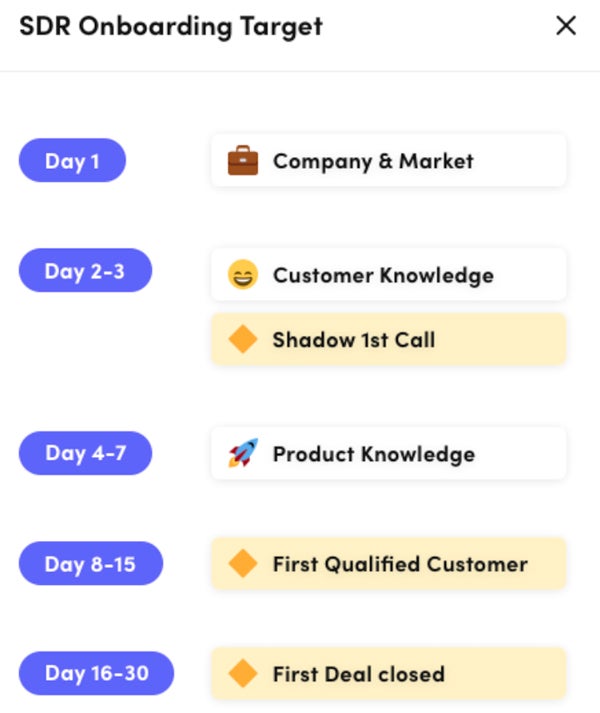
Top 3 AI Training Software & Tools
Here are leading AI sales training tools that will help you integrate artificial intelligence into your company’s sales skill development program.
PitchMonster
PitchMonster is an AI sales role-playing software that allows reps to speak with AI-powered avatars who are trained on your customer data.
With these human-like avatars, reps can practice handling objections, opening calls, and much more.
After each training session, the tool offers feedback about the rep’s performance that is based on your company’s standards.
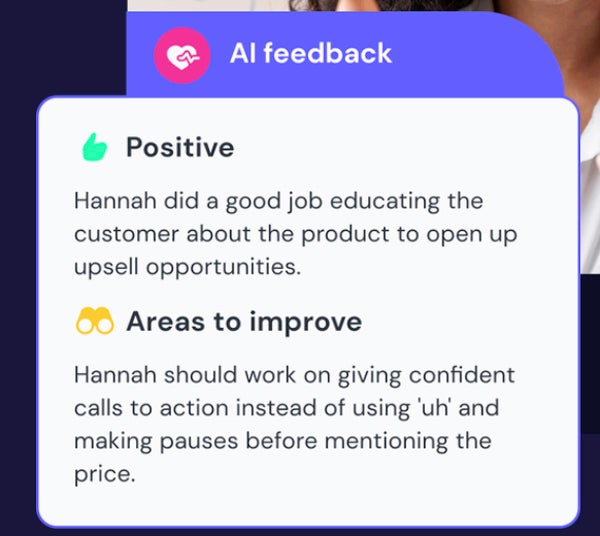
Mindtickle
Mindtickle is sales coaching software that comes with conversational intelligence and performance analysis features that help coaches identify weaknesses among their sales reps and design more personalized sales training plans.
Mindtickle also allows you to create AI-based call scores, themes, and trackers to spot teachable moments within sales calls.
Further, you can build call libraries of both good and bad examples that sellers can access and study to improve their craft.
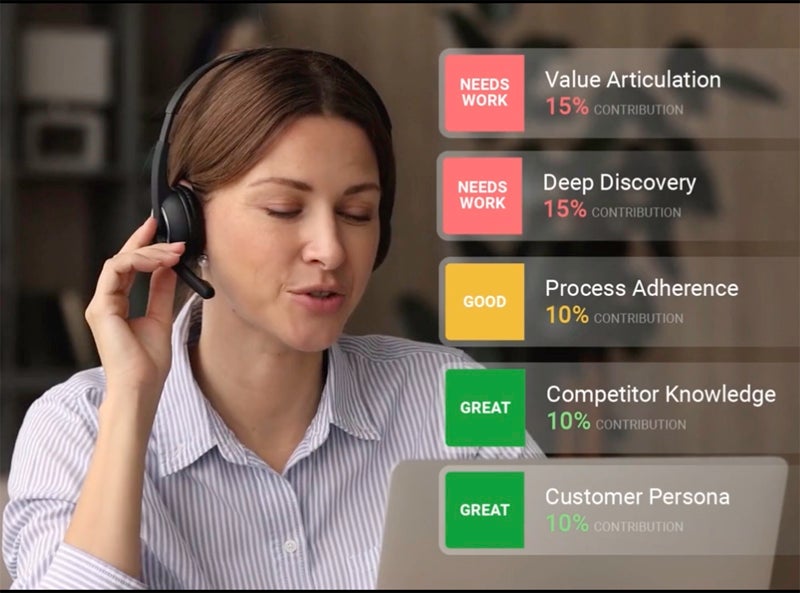
Gong
Gong is an AI coaching platform that monitors and analyzes your rep’s sales calls and provides them with data-driven feedback that’s grounded in the tool’s understanding of what actions and behaviors drive success or failure.
It’s also extremely helpful for sales coaches. By analyzing thousands of your team’s calls, Gong’s AI can identify the topics, phrases, and behaviors that are worth replicating across your team or abandoning entirely.
This gives sales coaches valuable direction and material for their training programs.
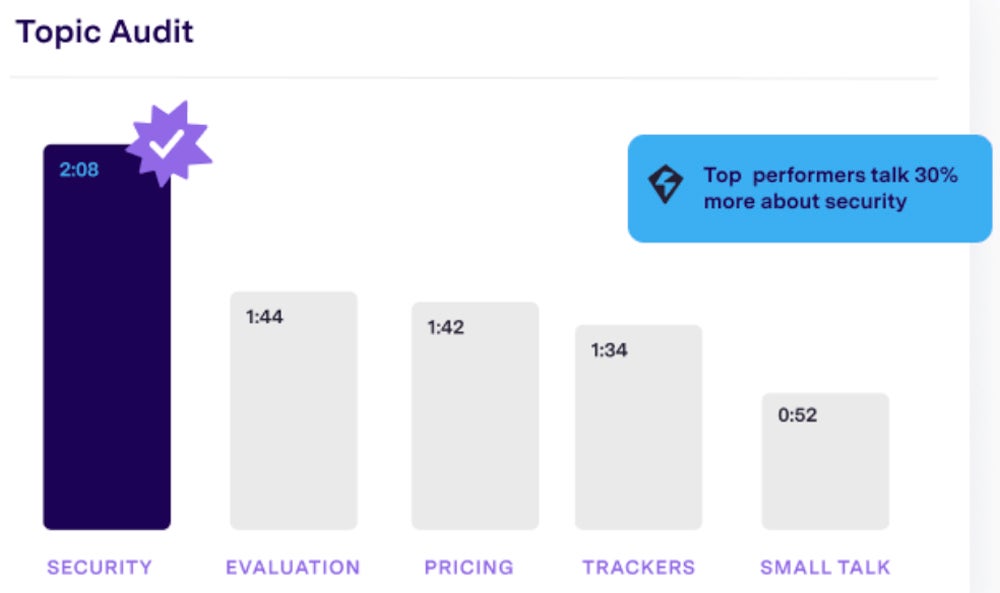
Bottom Line: AI Boosts the Quality of Sales Training
AI sales tools are entering almost every part of sales, from cold email to forecasting. But sales training may be the area where it has the greatest potential to improve the actual performance of reps.
By facilitating role-play sessions and providing data-driven performance feedback to reps and coaches, AI sales training software can help reps get the practice and advice they need to develop their skills, kick bad habits, and reach their full potential.
To see a list of the leading generative AI apps, read our guide: Top 20 Generative AI Tools and Apps
